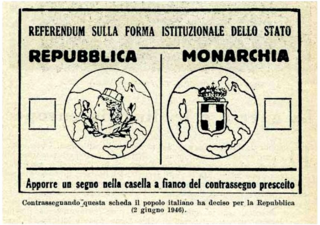Festa della Repubblica
Thomas Jones
On 2 and 3 June 1946 a referendum was held in Italy with a simple choice on the ballot: ‘republic’ or ‘monarchy’. On a turnout of 89 per cent – with not quite universal suffrage; men over 21 and women over 25 – the republic won with 54.3 per cent of the vote.
Victor Emmanuel III had been on the throne since the beginning of the century, and presided over, or acquiesced in, the rise of Mussolini and Fascism’s worst excesses (in 1936 he accepted the title of Emperor of Ethiopia). In 1944, as the Allied armies fought their way north up the peninsula, he handed over most of his powers to his son, Umberto, and formally abdicated in May 1946. Umberto II, the ‘May King’, reluctantly left the country on 13 June, having ruled for only 34 days, still complaining that the vote had been rigged. It was a delicate moment: after two years of civil war, Italy was deeply divided along several fault lines – Fascist and anti-fascist, industrial north (overwhelmingly republican) and rural south (strongly monarchist).
Under the Italian constitution, which came into force at the beginning of 1948, any member of the House of Savoy was expressly forbidden from holding public office, and the former kings, their consorts and male descendants were banned from entering the country. (Those articles were seen to have expired and revoked in 2002.) The new head of state would be a non-executive president, elected by members of both houses of parliament and regional representatives.
The presidency has, in practice, been far from perfect (see, for example, Perry Anderson on Giorgio Napolitano); earlier this year, when Sergio Mattarella’s seven-year term came to end, there was a farcical series of inconclusive votes in parliament, including an abortive right-wing push to elect Silvio Berlusconi to an office that is still supposed to carry a measure of dignity, which ended with Mattarella being awarded a second term he claimed not to want but reluctantly accepted. No one will be surprised if he steps down early to make way for Mario Draghi once the former central banker concludes his unelected stint as prime minister (there has to be a general election before June 2023).
But, in principle, the Italian presidency, as described in the constitution, has much to recommend it: the role is open to any enfranchised citizen over the age of fifty, and incompatible with any other office. The president, like any other citizen, is not above the law. And 2 June is a holiday in Italy every year, not only once a decade.

Comments